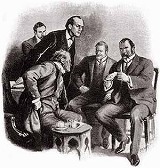“And now I come to the amazing part of my tale. When I woke it was broad daylight. I glanced at my watch, and the time was nearly nine. I had particularly asked to be called at eight, so I was very much astonished at this forgetfulness. I sprang up and rang for the servant. There was no response. I rang again and again, with the same result. Then I came to the conclusion that the bell was out of order. I huddled on my clothes and hurried downstairs in an exceedingly bad temper to order some hot water. You can imagine my surprise when I found that there was no one there. I shouted in the hall. There was no answer. Then I ran from room to room. All were deserted. My host had shown me which was his bedroom the night before, so I knocked at the door. No reply. I turned the handle and walked in. The room was empty, and the bed had never been slept in. He had gone with the rest. The foreign host, the foreign footman, the foreign cook, all had vanished in the night! That was the end of my visit to Wisteria Lodge.”
Sherlock Holmes was rubbing his hands and chuckling as he added this bizarre incident to his collection of strange episodes.
“Your experience is, so far as I know, perfectly unique,” said he. “May I ask, sir, what you did then?”
“I was furious. My first idea was that I had been the victim of some absurd practical joke. I packed my things, banged the hall door behind me, and set off for Esher, with my bag in my hand. I called at Allan Brothers’, the chief land agents in the village, and found that it was from this firm that the villa had been rented. It struck me that the whole proceeding could hardly be for the purpose of making a fool of me, and that the main object must be to get out of the rent. It is late in March, so quarter-day is at hand. But this theory would not work. The agent was obliged to me for my warning, but told me that the rent had been paid in advance. Then I made my way to town and called at the Spanish embassy. The man was unknown there. After this I went to see Melville, at whose house I had first met Garcia, but I found that he really knew rather less about him than I did. Finally when I got your reply to my wire I came out to you, since I gather that you are a person who gives advice in difficult cases. But now, Mr. Inspector, I understand, from what you said when you entered the room, that you can carry the story on, and that some tragedy has occurred. I can assure you that every word I have said is the truth, and that, outside of what I have told you, I know absolutely nothing about the fate of this man. My only desire is to help the law in every possible way.”
“I am sure of it, Mr. Scott Eccles - I am sure of it,” said Inspector Gregson in a very amiable tone. “I am bound to say that everything which you have said agrees very closely with the facts as they have come to our notice. For example, there was that note which arrived during dinner. Did you chance to observe what became of it?”
“Yes, I did. Garcia rolled it up and threw it into the fire.”
“What do you say to that, Mr. Baynes?”
The country detective was a stout, puffy, red man, whose face was only redeemed from grossness by two extraordinarily bright eyes, almost hidden behind the heavy creases of cheek and brow. With a slow smile he drew a folded and discoloured scrap of paper from his pocket.

“It was a dog-grate, Mr. Holmes, and he overpitched it. I picked this out unburned from the back of it.”
Holmes smiled his appreciation.
“You must have examined the house very carefully to find a single pellet of paper.”
“I did, Mr. Holmes. It’s my way. Shall I read it, Mr. Gregson?”
The Londoner nodded.